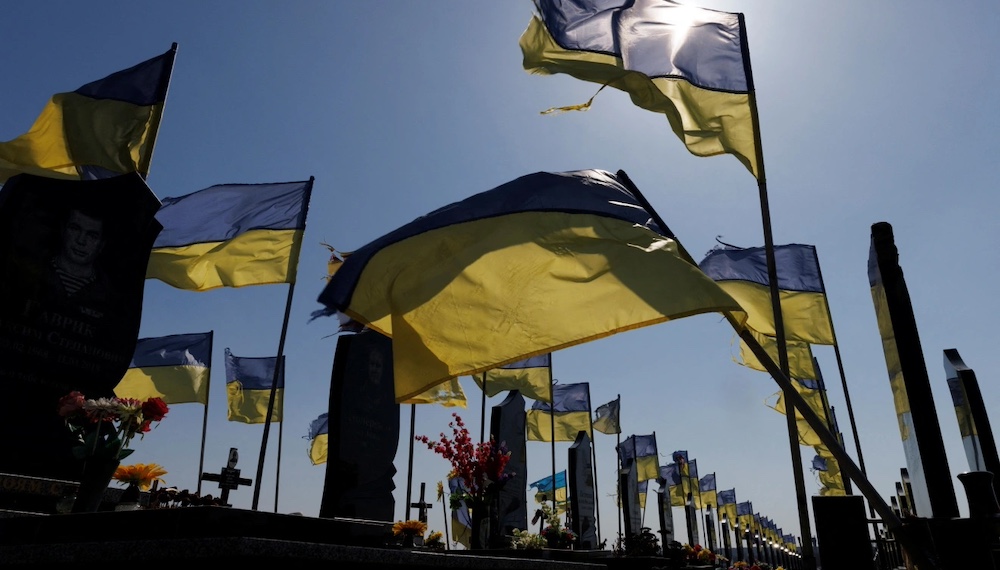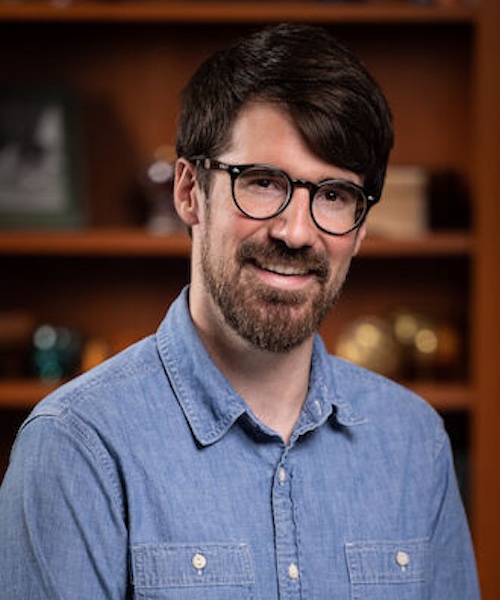When Russia ignited war by invading Ukraine on February 23, Matt and Lily Snyder couldn’t sit idly in the comfort of their Chicago home and watch tragic events unfold. They took their support a bold step further—and 4,700 miles farther.
Matt Snyder ’13—an instructor of Communications at Moody since 2020—and his wife flew to Poland to serve Ukrainian refugees March 5–12 during Moody Bible Institute’s spring break. Their trip was eye opening, emotional, and life changing, and they plan to do significantly more for Ukrainians in the near future as God directs them.
‘I want to support my people’
Lily was born and raised in Kyiv and lived in western Ukraine for several years with Matt after they married before moving to the US in 2020. They hoped to connect on their trip with Lily’s immediate family, but some have stayed in the capital city of Kyiv, while others are dispersed throughout the country. The Snyders can only keep in touch with them by phone.
“None of them is sleeping at home,” Matt reported.
The Snyders also witnessed the emotional devastation sustained by families physically torn apart by the war. Ukrainian men ages 18–60 are prohibited from leaving Ukraine. Most of the refugees that Matt and Lily met and observed were women, small children, teenagers, and the elderly. If families wanted to board buses and trains for safety in Poland and in Western European countries, many had to reluctantly flee without their husbands, fathers, and brothers.
Once the war began, Lily told Matt “I want to support my people” as a translator for refugees. Matt accompanied her to assist however he could.
“We weren’t worried about our safety,” Matt said. “At this point western Ukraine is much safer than the eastern regions.”
Sense of desperation
When the Snyders arrived in Poland March 5, they witnessed firsthand the sense of desperation that persistently haunts refugees each day of the war.
“Ukrainian refugees stood in line for hours to cross the borders on foot,” Matt recalled. “Many waited from several hours to several days to cross the border in their cars. Most Ukrainians had just the coats on their backs and a suitcase or backpack of belongings. Some were dazed, frantically asking when they could return home, or if they’d ever return home at all.”
Matt and Lily volunteered in Medyka and another Polish border city, Krościenko, as well as in Vyšné Nemecké, Slovakia. As a translator, Lily connected Ukrainians with services provided by European volunteers, including bus and rail transportation, food, clothing, medical care, free Europe-wide SIM cards, and temporary warming tents.
Most flats and hostels were full near the border. They secured modest accommodations 90 minutes south of the border town of Medyka. Their first impressions of the refugee crisis in Medyka were unforgettable.
“Buses and trains operated throughout the day, so the lines of refugees remained relatively short,” Matt said. “But as evening came, the bus and train schedules slowed down, the lines swelled, and those not wanting to lose their place in line stood out in the cold as snow fell. Others huddled in large tents, laying on cots or in sleeping bags to warm up.”
Running into roadblocks
When Matt and Lily first arrived in Poland, Matt planned to deliver people and humanitarian aid across the border in a van purchased for that purpose by Ukrainian friends staying nearby in Mukachevo, Ukraine. But those plans had to be scrapped amid the chaos of the war.
“We picked up the van from a couple who was able to make it out to Warsaw,” Matt said. “During our stay, the van’s documents didn’t go through, so we left it on the Slovakian border to be picked up by someone else at a later date.”
Blessing Ukrainians with vital support
But amidst the disheartening setbacks, the Snyders were able to personally bless numerous Ukrainians with financial support crucial to their survival during the conflict. Families and individuals were overjoyed to receive these gifts.
“Many of our friends and family members in the United States wanted to support Ukraine, so they sent money for us to distribute how we saw fit,” Matt said. “We gave money for medical kits, blankets, and sleeping bags for soldiers; for evacuation and humanitarian aid efforts; and for refugees with specific needs.”
Entering Ukraine
Lily and Matt then ventured inside western Ukraine for two days to visit church families and ministry partners. One organization leased a small hotel to supply rooms for church families forced to evacuate their homes in Kyiv.
“We worshiped the Lord in song together and gathered in His Word,” Matt said. “Taking a break from news stories bombarding our telegram channels and inboxes gave us tremendous peace being with God’s people who were far from their homes.”
In the midst of a brazen Russian conflict that has left 10 million Ukrainians displaced and thousands killed, the Snyders observed uncommon courage among refugees and aid workers.
“The refugees from our church family don’t complain,” Matt said. “They are weary from grief and exhaustion but continue to gather supplies and send them to others we know on the front lines in hotspots. The young adults worked tirelessly to organize relief efforts, sending humanitarian aid and medical supplies to cities. Many fathers and husbands make trip after trip into dangerous zones to deliver supplies and evacuate people out of immediate danger.
“The web of God’s people working together is a beautiful sight to behold.”
Pursuing long-term solutions
Matt and Lily’s firsthand experiences inside the war motivated them to strategize how best to serve refugees today and after the war ends. The Snyders are collaborating with one of Matt’s cousins, a lawyer, to establish a nonprofit charity that will seek long-term relief solutions for Ukrainians.
“As with many other organizations, we are working to gather humanitarian aid for medical and refugee relief,” Matt said. “We are also looking to the future once the war is over. Many homes and apartments have been destroyed. Whether people decide to live in new countries or return to their former cities, extensive rebuilding will be needed.
“We hope to help support families as they rebuild their lives from the ground up . . . Like any of us would be in their position, they find themselves on the run and seeking the basic necessities of life: a place to stay, food to eat, water to drink, and clothing to wear. Many wonder if they will have a home to return to.”





